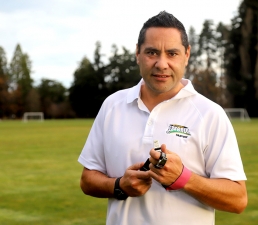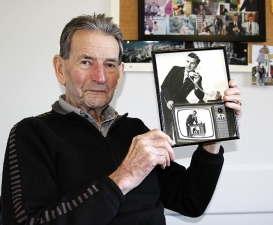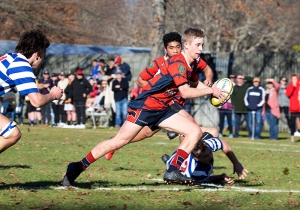Search

 Mid Canterbury’s Kevin Opele was named Outstanding Senior Official of the Year at the Mid Canterbury Sports Awards this week. Photo Adam BurnsIf versatile had a name within Mid Canterbury sporting circles, it would be Kevin Opele.
Mid Canterbury’s Kevin Opele was named Outstanding Senior Official of the Year at the Mid Canterbury Sports Awards this week. Photo Adam BurnsIf versatile had a name within Mid Canterbury sporting circles, it would be Kevin Opele.
A highly adaptable operator, the 42-year-old has been a sporting official for 22 years and has come to juggle several codes at the highest level in the district.
In all likelihood, he is probably clutching a whistle more often than not.
The height of these chameleon-like qualities reached remarkable levels last year when Opele was in charge of four pivotal sporting occasions.
He officiated the Luisetti Seeds Combined Country Cup rugby final, the Watters Cup final, Mid Canterbury Netball’s premier one final and the Aoraki Rugby League grand final.
It made him a clear-cut contender at the Mid Canterbury Sports Awards this week, and he was named Outstanding Senior Official of the Year.
For a role that can be a thankless proposition, acknowledgement for this official is more than warranted, and Opele was thrilled with the accolade.
“Like any award, it’s a pat on the back for all the hard yards that you chuck in yourself,” he said.
“I was pretty stoked with it.”
His delight was bolstered by some of the challenges which come with being a proficient referee or umpire.
The experienced adjudicator said it can be an isolating job compared to being among a team.
“She’s pretty lonely being an official in sports,” he said. “It’s not like you meet up with team-mates and go through training sessions.”
Although one perk which comes with the territory includes watching “hours and hours” of sport to hone the technical insight within each code.
He said it was not so much knowing the rules but when and how you applied them.
“I learned a lot from going out and training with teams.
“Their interpretation and my interpretation can be quite different, but if you work with teams to get a better outcome then the game is obviously a helluva lot better.”
Given the subjective nature of some sports’ laws, particularly rugby, dialogue with both coaches and players was key.
Although officiating three winter codes is no small feat, netball’s mid-week games helped Opele co-ordinate his respective commitments.
His winter schedule meant rest days on Mondays and Fridays.
Like your average youngster, Opele played sport at high school, including football and hockey, before taking up rugby at the age of 16.
“Touch (rugby) was probably the most enjoyable game I played,” he said.
“And then later, when I pointed out what I thought was poor officiating, they told me to have a go. That’s basically how I started officiating.”
Opele officiated touch rugby for more than a decade, which led him all the way to the very top level.
“I went into internationals.
“That was pretty much the grounding for me in officiating was doing touch.”
The first touch international that he was in charge of between New Zealand and Australia remains a career highlight.
The speed of the sport also attuned his reactions which had benefited his judgement across other codes, he said.
As a referee, he believes he has a casual approach to officiating, preferring sporting fixtures to be more free-flowing.
“One year with Hampstead and Southern I did it to the letter of the law, and it was the worst 40 minutes you’d ever seen in a game as players couldn’t adapt to my expectations,” he said.
“I decided I was going to let it play out like it should and in the second half there was only two penalties in the half.
“When I blew the whistle at the end everyone was just on their hands and knees.”
Despite boasting a rich resume, there are still further milestones within Opele’s sights.
He is hoping to gain a New Zealand badge in netball, which may or may not be possible this year with no representative tournaments.
“That’s the last one I need to tick off,” he said.
For the upcoming season, he is scaling back his refereeing duties by taking a break from rugby.
“I’ve said I’ll help if they’re in dire need.
“But yeah I’m giving up one of the sports just to give some time to myself.”
By Adam Burns © The Ashburton Guardian - 13 June 2020
 Ron Arthur was heavily involved in introducing television to New Zealand in his younger years. Photo Susan SandysIt was the birth of a new era when television came to New Zealand 60 years ago. Ashburton’s Ron Arthur was among those helping to bring the magic of moving pictures into living rooms. Susan Sandys reports.
Ron Arthur was heavily involved in introducing television to New Zealand in his younger years. Photo Susan SandysIt was the birth of a new era when television came to New Zealand 60 years ago. Ashburton’s Ron Arthur was among those helping to bring the magic of moving pictures into living rooms. Susan Sandys reports.
Ron Arthur spent much of his childhood in Ashburton, and was an enthusiastic Air Training Corps Ashburton member as a teenager in 1950.
Under the direction of Flying Officer Scott, he would co-pilot Tiger Moths on flights from the airport at Ashburton on Sundays, the open-cockpit experience a highlight of his young years.
“You just sat there and the wind used to blow through your hair,” he said.
Leaving his Ashburton High School days behind, Ron went off to compulsory military training at the age of 18 at Whenuapai before settling in Nelson.
His earlier fascination with Tiger Moths was soon replaced by something just as exciting – television.
Ron co-owned and managed three home appliance businesses in the area – at Motueka, Stoke and Nelson.
After television was introduced to New Zealand in 1960, he was among those who dedicated themselves to bringing the new medium to his area.
He was the first retailer to stock televisions in Nelson, but selling the sets went hand-in-hand with gaining transmission.
“The people wouldn’t just buy a TV set, we had to bring it into their house, show them what type of signal they were going to get, and then they would buy it from you,” he said.
“And when we took TV sets into people’s homes to try, you should have seen their faces, they used to light up.”
There could be as many as a dozen people at each house, neighbours having come along as well.
And the moment of turning on the TV for the first time was always highly anticipated by the awaiting audience.
The lights would go off, curtains were drawn, and everyone would be silent.
“They were quite exciting days when we first started,” he said.
Ron had become involved with technicians in Nelson who were monitoring the signal from Wellington and ultimately managed to get a permanent signal in the early 1960s.
That was just the beginning however, and being able to push the signal into the valleys around the area became a labour of love.
Ron and the technicians would find themselves walking up many a high hill to install aerials and transmitters, with the help of a donkey to carry their equipment.
The higher the better, and at least one was installed on the top of a 12-metre high pine tree.
Ron climbed up the tree himself, with a tomahawk in hand to chop down branches along the way.
There was a near miss that day when he accidentally dropped the tomahawk and it landed near the technician’s foot.
Ron recalled a public meeting about television coming to the area in a Tapawera community hall, with about 60 people who were interested in seeing what this new technology would be like.
There were three to four sets on the stage, their modern façade sparkling and set off perfectly by the blue carpet.
Soon, at the push of a large button positioned near the channel dial on each set, the room was transformed.
“We turned those on, and the people went ‘wow’.”
About 15 families bought television sets that night.
The few who were first to get television in those early days got used to having people sit outside their homes, peering through the window watching it.
This happened to Ron at his own house as well, but he encouraged it as he wanted people to see how fantastic TV was.
He even put a speaker out to his front lawn, so people coming along and looking through the window at the TV could also hear the audio.
However, as spectacular as television was, depending on where one lived, it could take some dedication to watch it.
When the screen was “snowy”, getting some distance from it could make things better, perhaps similar to the technique people try today of squinting their eyes to see through pixelation.
“You had to be at least 20 feet away, because the picture was snowy. If you were some distance away you could see it,” he said.
Those first people getting television sets also relied heavily on Ron to inform them about how they worked, and if they didn’t work, why not.
He said television used to automatically switch off at midnight, and every night at that time he would get phone calls from new television owners asking him why their screen had gone blank.
Indeed, it was the dawn of a new age, and one that Ron was very happy to be involved in.
“That was the best thing in my life,” Ron said.
“It was a great thrill to be involved along those lines, to see those things happening.”
Today, at the age of 85, Ron has a black and white photograph which reminds him of the wonder of those years.
In the picture, which was taken as a promotional image for his store, he is taking a phone call and leaning on a new television set.
© The Ashburton Guardian - 13 June 2020
 Charlie Brown looks to slice through the defence in the Mid Canterbury Combined 1st XV’s pre-season clash on Saturday. Photo Heathermack PhotographyIt may have only been a pre-season hit-out, but there were plenty of smiles around Ashburton College on Saturday afternoon following a comprehensive victory for the Mid Canterbury Combined 1st XV.
Charlie Brown looks to slice through the defence in the Mid Canterbury Combined 1st XV’s pre-season clash on Saturday. Photo Heathermack PhotographyIt may have only been a pre-season hit-out, but there were plenty of smiles around Ashburton College on Saturday afternoon following a comprehensive victory for the Mid Canterbury Combined 1st XV.
Playing against a Timaru Boys’ High School Second XV, the Mid Canterbury lads put together a polished performance, ticking off all the objectives that had been laid down by head coach Shane Enright.
“I was really pleased with how they went,” he said.
“It was a good solid hit-out and although only Timaru’s second XV they were a good side and put some pressure on us.”
As with any pre-season fixture, the list of goals for the match were laid out pretty simply prior to kick-off and Enright said that building on combinations and getting some game time under the belt was the main objective this week.
“We did what we needed to do well.
“They are a pretty young side with a number of guys having their first season out of Under 16, but they put together some nice play and scored some nice tries out wide which was nice to watch.”
Getting some confidence into his players and leaving them feeling buoyant after a good run around the paddock was critical as they challenge laid down this week is a monstrous one.
The combined side won the fixture 38-17.
The side heads to Nelson on Friday to take on defending UC Championship and South Island 1st XV champions Nelson College in a big first-up clash.
“I’d rather we played them now, than down the line once they’ve got into the swing of things.
“By the sounds of it they had a tough time of it in their pre-season game on Saturday, so getting them first-up might just be the best thing for us – it’ll give us plenty of build on anyway.”
Enright said that Michael Hennings, who joined the side from Suva this year, suffered a knee injury in the match on Saturday which would require some physio this week, but other than that injury the remainder of his side had emerged from the match unscathed.
By Matt Markham © The Ashburton Guardian - 15 June 2020


